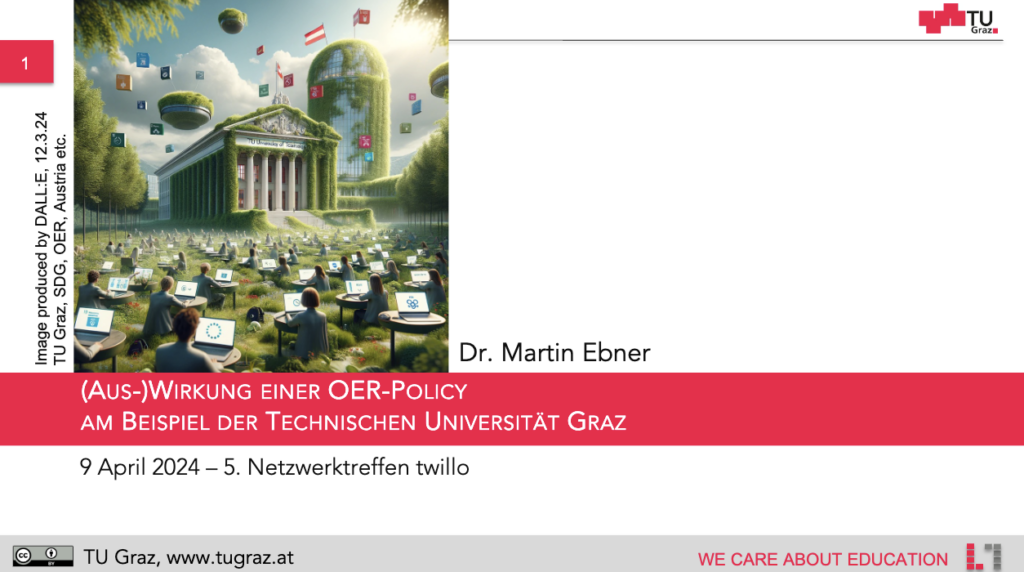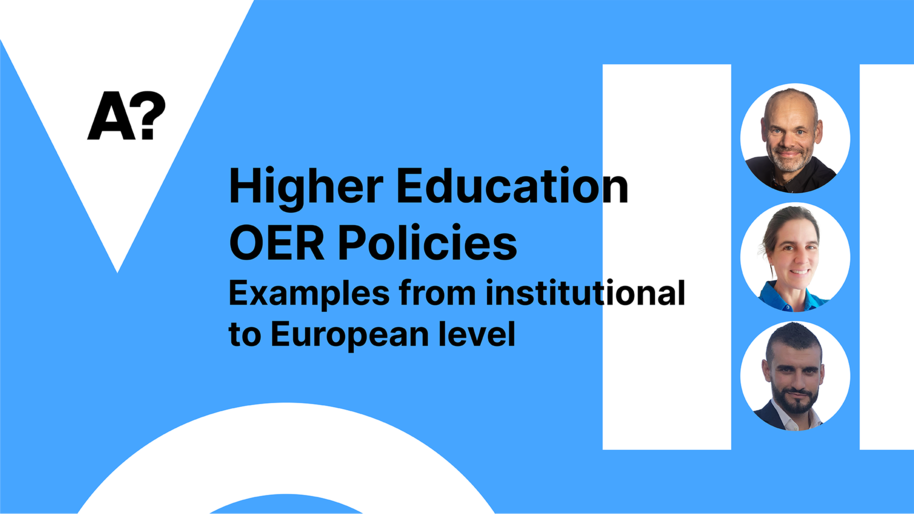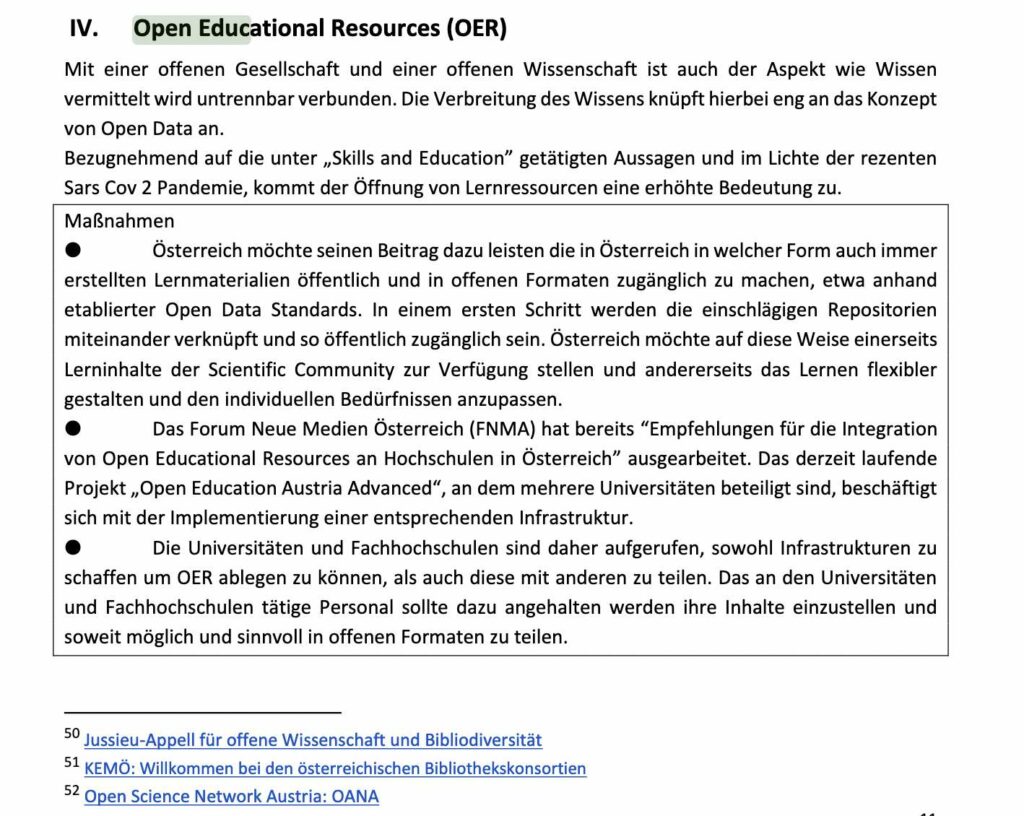Im Rahmen des 5. Netzwerktreffens twillo durfte ich über die Entstehung und die Erfahrungen mit unserer OER-Policy an der TU Graz reden – hier gibt es dazu die Folien:


Digitale Lehre an und rund um der Technischen Universität Graz
I am very happy to announce our webinar on „Higher Education OER Policies: Examples from institutional to European level“ within the UNITE! alliance. Aalto University will be the host and for sure you can get interesting informations on OER from the perspective of Austria:
Open Educational Resources (OER) movement is rooted in accessible high-quality education and enables systematic change in teaching and learning content (https://oercommons.org/about). In this webinar, the topic of Open Educational Resources will be addressed from different strategic perspectives in higher education: Our experts will therefore address the institutional level, a country level and at the level of a European university alliance.

Find here the link and registration possibility for the webinar [link to the webinar]
Wir wurden gebeten die Entwicklung und Aktivitäten rund um OER-Policys im Rahmen der AG „OER-Policy und -Governance“ vorzustellen. Hier gibt es unsere Folien dazu:

Ebner, Martin & Schön, Sandra (2023). Entwicklung und Aktivitäten rund um OER-Policys im österreichischen Hochschulraum. Präsentation bei der KNOER-AG „OER-Policy und -Governance“, 15. März 2023, DOI: 10.3217/dezyp-hnq83,https://www.researchgate.net/publication/369229655_Entwicklung_und_Aktivitaten_rund_um_OER-Policys_im_osterreichischen_Hochschulraum#fullTextFileContent
Im FNMA-Magazin 1/2022 haben wir die Ergebnisse des Webinars im Dezember 2021 nochmals zusammengefasst unter dem Titel „Weitere österreichische Hochschulen veröffentlichen eine Policy zu offenen Bildungsressourcen – Zum Austausch der AG OER„:
Bei der fnma-Arbeitsgruppe zu offenen Bildungsressourcen dreht sich alles um die bisherige Entwicklung und Förderung von OER. Anfang Dezember 2021 ging es um Erfahrungen mit der Erstellung von strategischen Bekenntnissen und Maßnahmen österreichischer Hochschulen.
[Artikel @ ResearchGate]
[FNMA-Magazin 1/2022]
Zitation: Ebner, Martin und Schön, Sandra (2022). Weitere österreichische Hochschulen veröffentlichen eine Policy zu offenen Bildungsressourcen – Zum Austausch der AG OER. In: fnma Magazin, 1/2022, S. 7-9.
Our publication about „OER Impact Assessment: A framework for higher education institutions and beyond. Approaches to assess the impact of Open Educational Resources“ got published.
Abstract:
The purpose of this paper is to provide an overview of approaches to and insights for impact assessment on open educational resources (OER) in higher education and building on this to sketch a framework for university focussed OER impact assessment. The authors describe the literature on impact assessment in the OER context and the existing contributions to OER impact assessment in higher education. Findings of the analysis are that there are few contributions on the effects of OER in general or of specific OER initiatives. Four contributions are presented in more detail. From these examples and the literature analysis, derivations, and challenges for OER impact assessment are drawn, such as the large diversity in OER purposes and the invisibility of the re-usage of OER. The contribution sketches a framework model for describing OER-relevant results, outcomes, and impact, and more specifically demonstrates how this can be done for exemplary OER-related objectives. This contribution is thus of relevance to funding bodies and institutions working in the context of higher education that wish to systematically evaluate and monitor statements about the effectiveness of OER activities according to the UNESCO (2019) OER recommendation.
[article @ journal’s homepage]
[article @ ResearchGate]
Reference: Ebner, Martin, Orr, Dominic and Schön, Sandra. „OER Impact Assessment: A framework for higher education institutions and beyond. Approaches to assess the impact of Open Educational Resources“ Open Education Studies, vol. 4, no. 1, 2022, pp. 296-309. https://doi.org/10.1515/edu-2022-0018
Togehter with my colleagues we did a research about OER policies in Higher Education with a strong focus on Germany, Austria and Switzerland for the Asian Journal of Distance Education:
Abstract:
The 2019 UNESCO recommendation on Open Educational Resources (OER) encourages member states to monitor policies and mechanisms in OER across the world. In higher education, there are many initiatives and policies around OER. This contribution gives insights into the current situation concerning OER policy documents that are of national or institutional relevance for public higher education institutions in Germany, Switzerland, and Austria. For each country, a different approach for identifying OER policy documents was chosen, dependent on the availability of documents and different dominant forms of documentation. Whereas digital documents available on the web were found as helpful sources for Germany, and performance agreements between the national ministry and individual universities were used for analysis in Austria, a survey amongst all universities was the chosen research approach in Switzerland to give an overview about potentially OER related policy documents. All these documents are now made available via the OER World Map. With this contribution, the authors also highlight the possibility of using the OER World Map as a powerful tool to collect and evaluate OER policy documents.
[full paper @ journal’s Homepage]
[full paper @ ResearchGate]
Reference: Neumann, J., Schön, S., Bedenlier, S., Ebner, M., Edelsbrunner, S., Krüger, N., Lüthi-Esposito, G., Marin, V. I., Orr, D., Peters, L. N., Reimer, R. T., & Zawacki-Richter, O. (2022). Approaches to Monitor and Evaluate OER Policies in Higher Education – Tracing Developments in Germany, Austria, and Switzerland. Asian Journal of Distance Education.
Die „Open Science Policy Austria“ ist erschienen und Österreich bekennt sich damit ganz klar zur Open-Science-Bewegung und will Open Access stärken. Im Zuge dessen spielt natürlich auch OER eine sehr bedeutende Rolle und das kann man auch in diesem Abschnitt lesen:

Wir nehmen diese erfreuliche Entwicklung natürlich als Auftrag uns weiter intensiv im Projekt Open Education Austria mit dem Thema zu beschäftigen und es auch voran zu treiben.
Im letzten fnma-Magazin haben wir einen kurzen Beitrag rund um die systematische Förderung von Open Educational Resources geht, indem wir die beiden OER-Policies der Universität Graz und der TU Graz beschreiben.
Zitation: Schön, S., Ebner, M. & Kopp, M. (2021). Systematische Förderung von offenen Bildungsressourcen an österreichischen Hochschulen mit OER-Policies. In: fnma Magazin 01/2021, Themenschwerpunkt zu „Chatbots in der (Hochschul-)Lehre”, S. 7-10, DOI: http://doi.org/10.5281/zenodo.4688404
Wir haben unsere OER-Policy kurz in einem Beitrag für den Blog des Hochschulforum Digitalisierung beschrieben um so es noch einem breiteren Publikum zugänglich zu machen.
Die TU Graz sieht Open Educational Resources (OER) als wichtigen Bestandteil ihrer Lehrtätigkeit und hat beschlossen diese strategisch zu verankern. Zu diesem Zweck hat sie eine OER-Policy erstellt und veröffentlicht. Sandra Schön und Martin Ebner stellen den Weg zur OER-Policy und das Ergebnis in diesem Blogbeitrag vor.
Es freut mich, dass es nun gelungen ist, eine OER-Policy für die TU Graz zu veröffentlichen und unsere Abteilung neben Weiterbildung und Informationsmaterial nun ab sofort „OER as default“ hat:
„4. Lern-und Lehrressourcen, die an der TU Graz unter Inanspruchnahme der Services von unterstützenden Organisationseinheiten wie „Lehr-und Lerntechnologien” entstehen, werden ausschließlich als OER erstellt. Abweichungen sind zu begründen.„
Die Richtlinie steht natürlich offen lizenziert zur Verfügung und ich hoffe inständig auf viele Nachahmer:innen 🙂 .